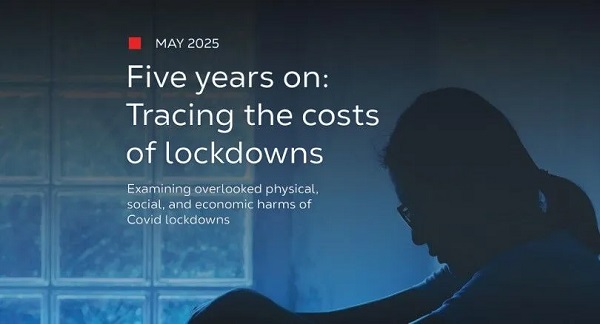Addictions
New Report – Five years on: Tracing the costs of lockdowns

In 2019, 67 percent of Canadians rated their mental health as “very good or excellent.” By 2023, that figure had dropped to just 54 percent.
A new report from the Justice Centre for Constitutional Freedoms examines the immediate and long-term negative impacts of Covid lockdowns, including physical, social, and economic harms. It also underscores the lack of transparent, evidence-based analysis by governments to justify these measures.
The report details how policies introduced with the stated goal of saving lives came at an extraordinary cost to Canadians’ mental and physical health, access to healthcare, economic security, and civil liberties.
One of the most concerning findings is the sharp decline in Canadians’ mental health. In 2019, 67 percent of Canadians rated their mental health as “very good or excellent.” By 2023, that figure had dropped to just 54 percent.
Meanwhile, the number of Canadians reporting “fair or poor” mental health nearly doubled—from 8 percent to 15 percent. This trend was seen across all age groups, but especially among young adults.
Indeed, despite facing minimal risk from Covid, young Canadians suffered some of the most serious consequences of lockdown measures. Non-Covid deaths among Canadians under age 45 rose by 22 percent, driven by factors such as disease, addiction, delayed treatment, and suicide. Physical activity among youth dropped significantly during this period, while time spent on screens—such as cell phones, computers, and tablets—increased sharply. Up to 70 percent of children and teens reported experiencing anxiety, depression, or other serious mental health issues.
A particularly alarming trend was the surge in opioid-related deaths. From 2020 to 2023, annual opioid overdose deaths increased by 108 percent. In 2023 alone, 8,606 Canadians died from opioid toxicity—more than double the pre-lockdown average. British Columbia, Alberta, and Ontario recorded the highest rates, with the vast majority of deaths involving fentanyl.
During Covid, thousands of medical check-ups, diagnoses, and treatments were delayed or cancelled, resulting in a serious and ongoing backlog in Canada’s healthcare system.
Wait times for medical treatments increased by 43 percent between 2019 and 2024, reaching a median of 30 weeks. MRI wait times rose by 55 percent. For certain cancers, including breast and prostate, surgery delays increased by as much as 34 percent. Since 2018, more than 74,000 Canadians have died while waiting for surgery or diagnostic care—over 15,000 of them in 2023–24 alone. The actual number is likely higher, due to poor provincial tracking and reporting.
The economic impact was equally severe. Lockdowns resulted in widespread job losses, particularly among low-wage workers, while the “laptop class” remained largely unscathed. While many public sector jobs expanded during this time, Canadians in hospitality, retail, and service sectors faced prolonged unemployment. The expansion of public spending and government debt contributed to rising inflation, driving up the cost of food, housing, and other essentials.
Crime rates also rose during the lockdown years. Homicides peaked in 2022 at 17 percent above trend, with 882 victims across Canada. Cybercrime nearly doubled, rising from 48,000 cases in 2019 to over 93,000 in 2023. Identity theft and fraud increased to 120 percent above trend in 2020, with similar levels in the following years. Particularly troubling was the rise in online child sexual exploitation, which reached 18,650 reported cases in 2023—a 173 percent increase from 2019.
Benjamin Klassen, Education Coordinator at the Justice Centre, says the findings demand accountability. “This report calls for governments to take responsibility for the damage done during this period and ensure that future public health policies uphold the Charter rights and freedoms of all Canadians.”
Mr. Klassen continues, “The Charter requires governments to ‘demonstrably’ justify any freedom-limiting policy. To date, no federal or provincial government in Canada has conducted the kind of comprehensive impact assessment required to justify the lockdowns.”
He concludes, “The evidence is clear: the harms of lockdowns outweighed their benefits. Canadians deserve an honest and transparent evaluation of lockdown harms, so that these mistakes are never repeated.”
Addictions
Canada is divided on the drug crisis—so are its doctors

When it comes to addressing the national overdose crisis, the Canadian public seems ideologically split: some groups prioritize recovery and abstinence, while others lean heavily into “harm reduction” and destigmatization. In most cases, we would defer to the experts—but they are similarly divided here.
This factionalism was evident at the Canadian Society of Addiction Medicine’s (CSAM) annual scientific conference this year, which is the country’s largest gathering of addiction medicine practitioners (e.g., physicians, nurses, psychiatrists). Throughout the event, speakers alluded to the field’s disunity and the need to bridge political gaps through collaborative, not adversarial, dialogue.
This was a major shift from previous conferences, which largely ignored the long-brewing battles among addiction experts, and reflected a wider societal rethink of the harm reduction movement, which was politically hegemonic until very recently.
Recovery-oriented care versus harm reductionism
For decades, most Canadian addiction experts focused on shepherding patients towards recovery and encouraging drug abstinence. However, in the 2000s, this began to shift with the rise of harm reductionism, which took a more tolerant view of drug use.
On the surface, harm reductionists advocated for pragmatically minimizing the negative consequences of risky use—for example, through needle exchanges and supervised consumption sites. Additionally, though, many of them also claimed that drug consumption is not inherently wrong or shameful, and that associated harms are primarily caused not by drugs themselves but by the stigmatization and criminalization of their use. In their view, if all hard drugs were legalized and destigmatized, then they would eventually become as banal as alcohol and tobacco.
The harm reductionists gained significant traction in the 2010s thanks to the popularization of street fentanyl. The drug’s incredible potency caused an explosion of deaths and left users with formidable opioid tolerances that rendered traditional addiction medications, such as methadone, less effective. Amid this crisis, policymakers embraced harm reduction out of an immediate need to make drug use slightly less lethal. This typically meant supervising consumption, providing sterile drug paraphernalia, and offering “cleaner” substances for addicts to use.
Many abstinence-oriented addiction experts supported some aspects of harm reduction. They valued interventions that could demonstrably save lives without significant tradeoffs, and saw them as both transitional and as part of a larger public health toolkit. Distributing clean needles and Naloxone, an overdose-reversal medication, proved particularly popular. “People can’t recover if they’re dead,” went a popular mantra from the time.
Saving lives or enabling addiction?
However, many of these addiction experts were also uncomfortable with the broader political ideologies animating the movement and did not believe that drug use should be normalized. Many felt that some experimental harm reduction interventions in Canada were either conceptually flawed or that their implementation had deviated from what had originally been promised.
Some argued, not unreasonably, that the country’s supervised consumption sites are being mismanaged and failing to connect vulnerable addicts to recovery-oriented care. Most of their ire, however, was directed at “safer supply”—a novel strategy wherein addicts are given free drugs, predominantly hydromorphone (a heroin-strength opioid), without any real supervision.
While safer supply was meant to dissuade recipients from using riskier street drugs, addiction physicians widely reported that patients were selling their free hydromorphone to buy stronger illicit fentanyl, thereby flooding communities with diverted opioids and exacerbating the addiction crisis. They also noted that the “evidence base” behind safer supply was exceptionally poor and would not meet normal health-care standards.
Yet, critics of safer supply, and harm reduction radicalism more broadly, were often afraid to voice their opinions. The harm reductionists were institutionally and culturally dominant in the late 2010s and early 2020s, and opponents often faced activist harassment, aggressive gaslighting, and professional marginalization. A culture of self-censorship formed, giving both the public and influential policymakers a false impression of scientific consensus where none actually existed.
The resurgence in recovery-oriented strategies
Things changed in the mid-2020s. British Columbia’s failed drug decriminalization experiment eroded public trust in harm reductionism, and the scandalous failures of safer supply—and supervised consumption sites, too—were widely publicized in the national media.1
Whereas harm reductionism was once so powerful that opponents were dismissed as anti-scientific, there is now a resurgent interest in alternative, recovery-oriented strategies.
These cultural shifts have fuelled a more fractious, but intellectually honest, national debate about how to tackle the overdose crisis. This has ruptured the institutional dominance enjoyed by harm reductionists in the addiction medicine world and allowed their previously silenced opponents to speak up.
When I first attended CSAM’s annual scientific conference two years ago, recovery-oriented critics of radical harm reductionism were not given any platforms, with the exception of one minor presentation on safer supply diversion. Their beliefs seemed clandestine and iconoclastic, despite seemingly having wide buy-in from the addiction medicine community.
While vigorous criticism of harm reductionism was not a major feature of this year’s conference, there was open recognition that legitimate opposition to the movement existed. One major presentation, given by Dr. Didier Jutras-Aswad, explicitly cited safer supply and involuntary treatment as two foci of contention, and encouraged harm reductionists and recovery-oriented experts to grab coffee with one another so that they might foster some sense of mutual understanding.2
Is this change enough?
While CSAM should be commended for encouraging cross-ideological dialogue, its efforts, in this respect, were also superficial and vague. They chose to play it safe, and much was left unsaid and unexplored.
Two addiction medicine doctors I spoke with at the conference—both of whom were critics of safer supply and asked for anonymity—were nonplussed. “You can feel the tension in the air,” said one, who likened the conference to an awkward family dinner where everyone has tacitly agreed to ignore a recent feud. “Reconciliation requires truth,” said the other.
One could also argue that the organization has taken an inconsistent approach to encouraging respectful dialogue. When recovery-oriented experts were being bullied for their views a few years ago, they were largely left on their own. Now that their side is ascendant, and harm reductionists are politically vulnerable, mutual respect is in fashion again.
When I asked to interview the organization about navigating dissension, they sent a short, unspecific statement that emphasized “evidence-based practices” and the “benefits of exploring a variety of viewpoints, and the need to constantly challenge or re-evaluate our own positions based on the available science.”
But one cannot simply appeal to “evidence-based practices” when research is contentious and vulnerable to ideological meddling or misrepresentation.
Compared to other medical disciplines, addiction medicine is highly political. Grappling with larger, non-empirical questions about the role of drug use in society has always necessitated taking a philosophical stance on social norms, and this has been especially true since harm reductionists began emphasizing the structural forces that shape and fuel drug use.
Until Canada’s addiction medicine community facilitates a more robust and open conversation about the politicization of research, and the divided—and inescapably political—nature of their work, the national debate on the overdose crisis will be shambolic. This will have negative downstream impacts on policymaking and, ultimately, people’s lives.
Our content is always free – but if you want to help us commission more high-quality journalism,
consider getting a voluntary paid subscription.
Addictions
The War on Commonsense Nicotine Regulation

From the Brownstone Institute
Cigarettes kill nearly half a million Americans each year. Everyone knows it, including the Food and Drug Administration. Yet while the most lethal nicotine product remains on sale in every gas station, the FDA continues to block or delay far safer alternatives.
Nicotine pouches—small, smokeless packets tucked under the lip—deliver nicotine without burning tobacco. They eliminate the tar, carbon monoxide, and carcinogens that make cigarettes so deadly. The logic of harm reduction couldn’t be clearer: if smokers can get nicotine without smoke, millions of lives could be saved.
Sweden has already proven the point. Through widespread use of snus and nicotine pouches, the country has cut daily smoking to about 5 percent, the lowest rate in Europe. Lung-cancer deaths are less than half the continental average. This “Swedish Experience” shows that when adults are given safer options, they switch voluntarily—no prohibition required.
In the United States, however, the FDA’s tobacco division has turned this logic on its head. Since Congress gave it sweeping authority in 2009, the agency has demanded that every new product undergo a Premarket Tobacco Product Application, or PMTA, proving it is “appropriate for the protection of public health.” That sounds reasonable until you see how the process works.
Manufacturers must spend millions on speculative modeling about how their products might affect every segment of society—smokers, nonsmokers, youth, and future generations—before they can even reach the market. Unsurprisingly, almost all PMTAs have been denied or shelved. Reduced-risk products sit in limbo while Marlboros and Newports remain untouched.
Only this January did the agency relent slightly, authorizing 20 ZYN nicotine-pouch products made by Swedish Match, now owned by Philip Morris. The FDA admitted the obvious: “The data show that these specific products are appropriate for the protection of public health.” The toxic-chemical levels were far lower than in cigarettes, and adult smokers were more likely to switch than teens were to start.
The decision should have been a turning point. Instead, it exposed the double standard. Other pouch makers—especially smaller firms from Sweden and the US, such as NOAT—remain locked out of the legal market even when their products meet the same technical standards.
The FDA’s inaction has created a black market dominated by unregulated imports, many from China. According to my own research, roughly 85 percent of pouches now sold in convenience stores are technically illegal.
The agency claims that this heavy-handed approach protects kids. But youth pouch use in the US remains very low—about 1.5 percent of high-school students according to the latest National Youth Tobacco Survey—while nearly 30 million American adults still smoke. Denying safer products to millions of addicted adults because a tiny fraction of teens might experiment is the opposite of public-health logic.
There’s a better path. The FDA should base its decisions on science, not fear. If a product dramatically reduces exposure to harmful chemicals, meets strict packaging and marketing standards, and enforces Tobacco 21 age verification, it should be allowed on the market. Population-level effects can be monitored afterward through real-world data on switching and youth use. That’s how drug and vaccine regulation already works.
Sweden’s evidence shows the results of a pragmatic approach: a near-smoke-free society achieved through consumer choice, not coercion. The FDA’s own approval of ZYN proves that such products can meet its legal standard for protecting public health. The next step is consistency—apply the same rules to everyone.
Combustion, not nicotine, is the killer. Until the FDA acts on that simple truth, it will keep protecting the cigarette industry it was supposed to regulate.
-

 MAiD2 days ago
MAiD2 days agoQuebec has the highest euthanasia rate in the world at 7.4% of total deaths
-

 Frontier Centre for Public Policy18 hours ago
Frontier Centre for Public Policy18 hours agoRichmond Mayor Warns Property Owners That The Cowichan Case Puts Their Titles At Risk
-

 Alberta1 day ago
Alberta1 day agoHow economic corridors could shape a stronger Canadian future
-

 Daily Caller2 days ago
Daily Caller2 days agoProtesters Storm Elite Climate Summit In Chaotic Scene
-

 Daily Caller1 day ago
Daily Caller1 day agoLaura Ingraham’s Viral Clash With Trump Prompts Her To Tell Real Reasons China Sends Students To US
-

 Alberta1 day ago
Alberta1 day agoWhen Teachers Say Your Child Has Nowhere Else to Go
-

 Automotive2 days ago
Automotive2 days agoThe high price of green virtue
-

 Energy15 hours ago
Energy15 hours agoCanada’s oilpatch shows strength amid global oil shakeup







